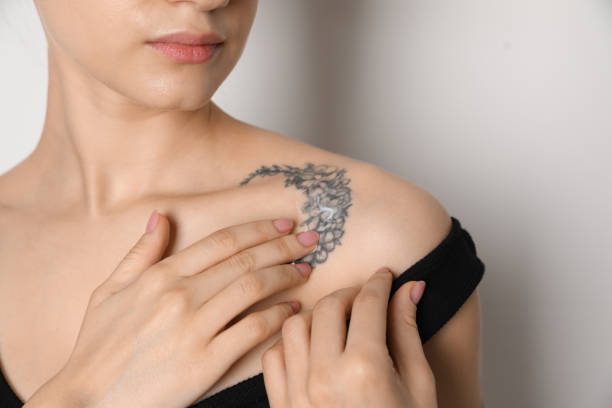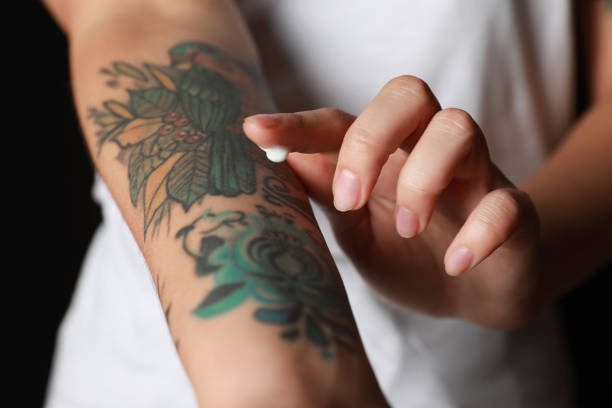⚠️ Medical Disclaimer
Important: This content is for informational and educational purposes only. It should not be used as a substitute for professional medical advice, diagnosis, or treatment. Always consult with a qualified healthcare provider before making changes to your diet, taking supplements, or if you have questions about a medical condition. Never disregard professional medical advice or delay seeking it because of information you read here.
Last Updated on January 11, 2024 by Grace Oluchi
Welcome to Medspurs’ comprehensive guide on tattoo aftercare! Getting a new tattoo is an exciting experience, and proper aftercare is crucial for ensuring its longevity and vibrant appearance. In this article, we will explore essential tips, best practices, and expert advice to help you navigate the healing process and keep your tattoo looking its best. Whether you’re a first-time tattoo enthusiast or a seasoned ink lover, let’s dive in deep into the world of tattoo aftercare and discover how to make your tattoo a true work of art.
What is Tattoo Aftercare?
Tattoo aftercare refers to the set of practices and precautions taken to promote proper healing and maintenance of a new tattoo. It involves caring for the tattooed area to minimize the risk of infection, reduce discomfort, and ensure the longevity and vibrancy of the tattoo. Proper aftercare is crucial in the days and weeks following the tattoo session to allow the skin to heal properly and prevent any complications that may affect the final outcome of the tattoo.


Tattoo aftercare typically involves cleaning the tattooed area, applying appropriate ointments or moisturizers, protecting the tattoo from sun exposure, avoiding certain activities or substances that can hinder healing, and following the instructions provided by the tattoo artist. The specific aftercare instructions may vary depending on the artist, the size and location of the tattoo, and individual factors like skin type and personal health.
The goal of tattoo aftercare is to allow the skin to heal naturally while preserving the clarity and vibrancy of the tattoo. By following proper aftercare practices, individuals can minimize the risk of infection, prevent scabbing or scarring, and promote the long-term beauty and integrity of their tattoo. It is important to adhere to the aftercare guidelines provided by the tattoo artist and seek their advice or medical attention if any complications arise during the healing process.
Tips for Tattoo Aftercare.
Caring for your new tattoo is crucial to ensure proper healing and long-term vibrancy. Here are essential steps to follow:
Keep it clean:
Gently wash your tattooed area with mild, fragrance-free soap and lukewarm water. Use your clean hands or a soft cloth to remove any excess blood, plasma, or ointment. Avoid scrubbing or using harsh towels, as they can irritate the tattoo.
Apply an ointment or moisturizer:
After washing, pat your tattoo dry with a clean towel. Then, apply a thin layer of tattoo-specific ointment or a fragrance-free, alcohol-free moisturizer recommended by your tattoo artist. This helps keep the skin moisturized and aids in the healing process. Repeat this step 2-3 times a day, following your artist’s instructions.
Protect from sun exposure:
Avoid direct sunlight and tanning beds during the initial healing period, as UV rays can fade and damage your tattoo. If going outside, cover your tattoo with clothing or use a broad-spectrum sunscreen (SPF 30+) to shield it from the sun. Apply sunscreen generously and reapply every 2 hours.
Avoid picking or scratching:
It’s normal for your tattoo to scab and itch during the healing process, but refrain from picking, scratching, or peeling the scabs. Let them heal and fall off naturally to prevent scarring or color loss.
Avoid swimming and intense physical activities:
Steer clear of swimming pools, hot tubs, saunas, and excessive sweating during the initial healing phase (usually 2-3 weeks). These activities can introduce bacteria and impede the healing process.
Wear clean, breathable clothing:
Opt for loose-fitting, soft clothing made from natural fibers to avoid friction or irritation on your tattooed skin. Ensure your clothing is clean to minimize the risk of infection.
Follow your artist’s instructions:
Your tattoo artist may provide specific aftercare instructions tailored to your tattoo. Follow their guidance regarding cleaning, moisturizing, and any additional precautions or products they recommend.
Stay vigilant for signs of infection:
Keep an eye out for symptoms like excessive redness, swelling, prolonged pain, pus, or a foul odor. If you suspect an infection, consult your doctor.
How to Prepare for a Tattoo Appointment.
Preparing for a tattoo appointment is essential to ensure a smooth and successful experience. Here are some detailed steps to help you prepare:
Research and choose a reputable tattoo artist:
Take the time to research different tattoo artists in your area. Look at their portfolios, read reviews, and assess their level of professionalism and hygiene. Choose an artist whose style aligns with your desired tattoo design.
Confirm the appointment details:
Once you’ve chosen an artist, contact them to schedule an appointment. Confirm the date, time, and any specific instructions they may have for preparation.
Hygiene and skincare:
In the days leading up to your appointment, maintain good overall hygiene. Take regular showers and keep the tattoo area clean. Avoid excessive sun exposure, as sunburned or damaged skin can make the tattooing process more challenging. Moisturize the skin to keep it healthy but avoid applying lotions or oils on the day of the appointment, as they can interfere with the tattooing process.
Stay hydrated and get enough rest:
Adequate hydration and rest are crucial for your body’s overall well-being and can contribute to a better tattoo experience. Drink plenty of water in the days leading up to your appointment and try to get a good night’s sleep before the big day.
Dress comfortably and appropriately:
On the day of your appointment, wear loose and comfortable clothing that allows easy access to the area where the tattoo will be placed. Avoid wearing anything that might rub against or irritate the tattooed skin.
Eat a balanced meal beforehand:
It’s essential to eat a nutritious and balanced meal before your tattoo appointment. This will help stabilize your blood sugar levels and prevent lightheadedness or fatigue during the session. Avoid consuming excessive amounts of caffeine or alcohol, as they can affect your body’s response and potentially increase sensitivity.
Bring necessary documents and essentials:
Remember to bring any required identification documents, such as a driver’s license or passport, as well as your appointment confirmation and any reference materials or designs you’ve discussed with the artist. Additionally, consider bringing a bottle of water and some snacks to keep yourself nourished and comfortable during the session.
What are the Signs of an Infected Tattoo?
Monitoring your tattoo for signs of infection is important during the healing process. Here are some common signs of an infected tattoo:
- Increased redness: While some redness is normal in the first few days after getting a tattoo, an infected tattoo may exhibit excessive or spreading redness around the tattooed area.
- Persistent pain or discomfort: While tattoos can be slightly tender during the healing process, if the pain worsens or becomes more intense over time, it could indicate an infection.
- Swelling: Mild swelling is normal, but if the area becomes increasingly swollen, puffy, or feels hot to the touch, it might be a sign of infection.
- Prolonged or excessive oozing: A small amount of clear or slightly colored fluid, along with minimal bleeding, is normal in the initial stages of healing. However, if the tattoo continues to ooze pus, yellow or green discharge, or blood for an extended period, it could indicate infection.
- Increased warmth: An infected tattoo may feel noticeably warm to the touch, indicating inflammation and potential infection.
- Foul odor: If your tattoo emits an unpleasant smell, it could be a sign of infection. This odor is often accompanied by other symptoms mentioned above.
- Formation of abscesses or bumps: Infected tattoos may develop painful, raised bumps or pustules around the tattooed area.
The Key Takeaway.
Proper tattoo aftercare is vital for the healing process and the long-term preservation of your tattoo’s beauty. By following the appropriate steps, such as keeping your tattoo clean, moisturized, and protected from sun exposure, you can minimize the risk of infection, scarring, and color fading. It’s crucial to adhere to the aftercare instructions provided by your tattoo artist and seek their guidance if you have any concerns or complications during the healing period.
Remember, each tattoo is unique, and individual healing times may vary. Patience and diligence in caring for your tattoo are key to achieving the best possible outcome. As your tattoo heals, continue to practice good skincare habits, moisturize regularly, and protect your tattoo from excessive sun exposure. By giving your tattoo the attention it deserves, you can ensure that it remains a stunning piece of art for years to come.
FAQs on Tattoo Aftercare.
How long does it take for a tattoo to heal?
The healing time for a tattoo varies depending on factors such as the size, location, and individual healing capabilities. Generally, it takes around 2-4 weeks for the surface of the tattoo to heal, but complete healing beneath the skin can take several months. Remember, everyone heals at their own pace, so be patient and follow proper aftercare guidelines.
Can I exercise or go to the gym after getting a tattoo?
It’s wise to avoid intense workouts or activities that cause excessive sweating during the initial healing phase of your tattoo (usually 2-3 weeks). Sweat can introduce bacteria into the tattooed area and impede the healing process. Listen to your body and consult your tattoo artist for specific recommendations based on your tattoo and individual circumstances.
Can I go swimming with a new tattoo?
It’s best to avoid swimming, including pools, hot tubs, and natural bodies of water, until your tattoo is fully healed. Submerging your tattoo in water can expose it to bacteria and prolong the healing process. Wait until the scabs have fallen off, the skin has fully healed, and you have received clearance from your tattoo artist before swimming.
What should I do if my tattoo develops itching?
Itching is a common part of the healing process but avoid scratching or picking at your tattoo. Instead, gently pat or lightly slap the tattooed area to alleviate the itching sensation. You can also try applying a thin layer of fragrance-free, alcohol-free moisturizer to soothe the skin. If itching persists or is accompanied by other concerning symptoms, consult your tattoo artist or a doctor.
When can I start applying sunscreen to my tattoo?
It’s important to protect your tattoo from sun exposure as it can fade the colors and cause damage. However, you should wait until your tattoo is fully healed before applying sunscreen. Once the tattoo has healed, typically after a few weeks, use a broad-spectrum sunscreen with a high SPF (30+) and apply it generously to your tattoo whenever it will be exposed to the sun.

